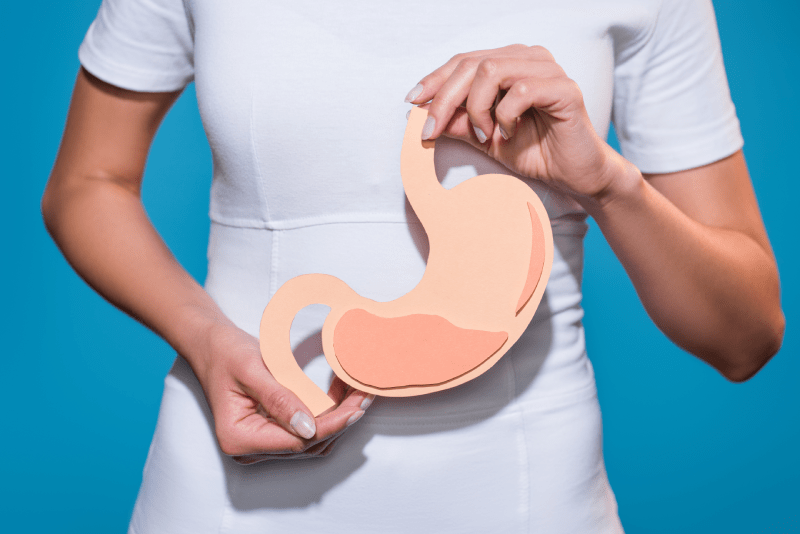What Is Gastric Bypass Surgery And How Is It Different?
Gastric Bypass is the method considered the “gold standard” of bariatric surgery. Unlike gastric sleeve surgery, this procedure includes both restrictive (stomach reduction) and malabsorptive (intestinal bypass) mechanisms.
In the surgery, a small stomach “pouch” is first created, and then a part of the small intestine is connected to the new pouch, so that consumed food bypasses a section of the intestine. This dual mechanism not only reduces the amount consumed but also restricts calorie and nutrient absorption, providing a stronger and faster improvement for metabolic diseases like type 2 diabetes.
How Are Kusadasi Gastric Bypass Prices Determined?
Gastric Bypass surgery prices in Kusadasi are generally in a higher range compared to gastric sleeve due to the complexity of the operation. The main factors determining the pricing are the accreditation level of the hospital where the surgery will be performed, the experience level of the surgical team, and the quality of the surgical instruments used. Additionally, whether comprehensive pre-operative tests, hospital stay duration, anesthesia and intensive care facilities, and lifelong follow-up and dietitian support are included in the package are parameters that directly affect the price.
What Are The Body Mass Index Requirements For Gastric Bypass?
The Body Mass Index (BMI) requirements for Gastric Bypass are similar to those for other bariatric surgeries, but this surgery is mostly preferred for patients with higher BMI or those with serious metabolic disease. Generally, all patients with a BMI of 40 or higher and individuals with a BMI between 35 and 40 who have co-morbidities such as uncontrolled type 2 diabetes or severe reflux are suitable. The pre-operative expert team performs a detailed evaluation to determine the patient’s general health status and the method from which they will benefit the most.
What Is The Weight Loss Rate After Surgery?
Gastric Bypass surgery has the highest and fastest weight loss rates among bariatric procedures. The vast majority of patients can expect to lose 70% to 85% of their excess weight within the first 1 to 2 years after the surgery. This high rate is due to both the restrictive effect of the small stomach pouch and the reduction in calorie absorption resulting from bypassing the small intestine. The long-term success of weight loss depends on the patient’s lifelong compliance with nutritional and exercise rules.
Why Is Gastric Bypass More Effective In Diabetes Treatment?
Gastric Bypass ensures that food directly reaches the lower part of the small intestine, changing the secretion of intestinal hormones very quickly and powerfully. This change rapidly improves insulin resistance. A large number of patients with type 2 diabetes can stop their insulin or diabetes medications immediately after the surgery or even before leaving the hospital. This hormonal and metabolic effect makes Gastric Bypass a more advantageous option than gastric sleeve, especially in patients with difficult-to-control type 2 diabetes.
What Is The Duration Of The Hospital Stay After Surgery?
The duration of hospital stay after Gastric Bypass surgery is generally slightly longer than for gastric sleeve, ranging between 4 and 6 days, due to the more complex nature of the operation. During this time, the medical team closely monitors the risk of possible leakage at the staple line, whether the new stomach pouch can handle liquid intake, and the patient’s pain management. Modern facilities in Kusadasi provide the necessary comfort and fully equipped supervision for this critical recovery period.
What Are The Advantages Of Having Surgery In Kusadasi?
The main reasons why Kusadasi is preferred for Gastric Bypass surgery are the European-quality surgical services offered at Turkey’s competitive prices. The post-operative recovery period is supported by the peaceful and morale-boosting sea views of the Aegean, which contributes to the patients’ psychological recovery. Additionally, Kusadasi’s proximity to Izmir Adnan Menderes Airport (ADB) offers travel and transfer convenience for international patients. Companies like Cure Holiday manage all these processes within package services.
What Risks Does Gastric Bypass Involve?
Gastric Bypass involves additional risks such as more serious nutritional deficiencies and the formation of marginal ulcers (sores at the intestinal connection) compared to gastric sleeve. Due to the bypassed section of the intestine, the absorption of iron, Vitamin B12, calcium, and folate can be negatively affected. Furthermore, since it is a technically more complex surgery, the operation duration is longer, and the risk of leakage at the anastomosis sites (connection lines) must also be carefully considered. All these risks are minimized by experienced surgical teams.
What Is Dumping Syndrome And How Is It Prevented?
Dumping syndrome is one of the most prominent side effects of Gastric Bypass surgery. It is triggered when foods, especially sugary, fatty, or high-calorie ones, pass very quickly into the small intestine due to the pylorus muscle of the stomach (the valve regulating stomach emptying) being bypassed. This situation leads to symptoms such as palpitations, sweating, diarrhea, nausea, and weakness. To prevent it, patients must adhere lifelong to nutritional rules aimed at eating slowly, separating liquids and solids, and strictly avoiding high-sugar foods.

Does This Surgery Provide A Permanent Solution?
Gastric Bypass surgery is one of the most powerful tools for the permanent management of excessive weight but does not guarantee a permanent solution on its own. The mechanical and hormonal changes provided by the surgery (stomach reduction and appetite decrease) are permanent. However, the risk of weight regain is always present if the patient returns to old unhealthy eating habits or consumes high-calorie nutrients in liquid form. Success depends on maintaining the discipline of regular exercise, compliance with nutritional rules, and follow-up after the surgery.
What Expert Consultations Are Required Before Surgery?
Comprehensive expert evaluations required before surgery are essential to maximize the safety and success of the operation. This process involves evaluation by a bariatric surgeon, anesthesiologist, internal medicine specialist (endocrinologist), and cardiologist. Additionally, a psychologist or psychiatrist consultation to evaluate the patient’s behavioral and psychological adequacy and a dietitian consultation to create the post-operative nutrition plan are also mandatory steps. This multi-disciplinary approach minimizes risks.
How Should Nutritional Supplements Be After Surgery?
Nutritional supplements after Gastric Bypass surgery are mandatory for life and may need to be taken in higher doses compared to gastric sleeve. Since a section of the intestine is bypassed, there is a serious decrease in the absorption of B12, iron, folic acid, and fat-soluble vitamins (A, D, E, K), as well as calcium. It is vital for patients’ health to track their vitamin and mineral levels with regular blood tests and to use the special bariatric multivitamins and additional supplements recommended by the doctor without fail.
What Is Included In The Kusadasi Surgery Package?
Bariatric surgery packages in Kusadasi are offered in an “all-inclusive” concept designed to meet all the needs of foreign patients. Typically, these packages include the surgical operation, 4-6 days of hospital stay, anesthesia and intensive care fees, all pre-operative blood and radiology tests. Additionally, interpreter support for foreign languages, airport (ADB) transfers, and first-year dietitian and surgeon follow-up after the surgery are also indispensable parts of the package.
What Pains Should Be Expected After Surgery?
Even when Gastric Bypass is performed laparoscopically, moderate pain is expected after the surgery. This pain includes stinging at the small incision sites, shoulder pain caused by gas bloating, and a general feeling of discomfort resulting from manipulation inside the abdomen. Pain is kept under control with intravenous (IV) strong painkillers during the hospital stay. Oral painkillers provided after discharge are usually sufficient. Early walking and movement greatly help reduce gas pain.
What Is The Importance Of Long-Term Follow-Up?
Long-term follow-up in Gastric Bypass surgery is of even more critical importance than for gastric sleeve. This is due to the risk of serious nutritional and vitamin deficiencies that may arise from malabsorption. Regular blood tests are essential for early diagnosis and timely correction of deficiencies. Additionally, follow-up with the surgeon and dietitian helps prevent the patient from deviating from nutritional habits and supports maintaining weight loss goals, ensuring the continuation of long-term success.
How Do Eating Habits Change After Surgery?
Eating habits after surgery undergo a radical change that lasts a lifetime. Patients must consume very small portions, chew every bite very slowly and well. The most important rule is the separation of liquids and solids (no liquid consumption 30 minutes before and after meals). Protein consumption should be prioritized. Compliance with these rules both ensures the new stomach pouch does not feel discomfort and prevents dumping syndrome, supporting the effective weight loss process.
What Is Its Effect On Reflux And Heartburn?
Gastric Bypass surgery is an excellent solution for patients with especially severe gastroesophageal reflux (GERD) and chronic heartburn problems. This is because the portion of the stomach exposed to acid (duodenum and small intestine) is bypassed, and the newly created small stomach pouch produces less acid. Since this surgery prevents stomach contents from flowing back into the esophagus, most patients can stop their reflux medications immediately after the surgery. This is a major advantage compared to gastric sleeve.
How Are Accommodation And Transfer Provided In Kusadasi?
Accommodation and transfers for international patients coming for Gastric Bypass surgery in Kusadasi are generally organized by institutions like Cure Holiday, included in the surgery package. This covers comfortable transfers for patients from Izmir Adnan Menderes Airport (ADB) to the hospital and hotel in Kusadasi. Luxury or boutique hotel accommodations suitable for rest near the hospital are provided. Spending the recovery period in the beautiful atmosphere of the Aegean supports recovery by reducing the patient’s stress levels.

When Should Physical Activity Begin After Surgery?
Physical activity is encouraged to start very early after surgery. Patients are encouraged to take short walks a few hours after the surgery, which reduces the risk of blood clots and accelerates bowel function. Light-paced walking usually begins within the first week. However, heavy lifting and strenuous exercises that strain the abdominal muscles must be strictly avoided for the first 6 weeks for the abdominal incisions to heal. With doctor’s approval, swimming and weight training can be slowly resumed after 6 weeks.
Is There An Age Limit For Gastric Bypass?
The age range of 18 to 65 is generally considered suitable for Gastric Bypass surgery. However, this range is not an absolute limit. For younger patients, parental consent and full disclosure of all risks are required, while for patients over 65, their cardiac and pulmonary (lung) health status is examined in more detail. The general rule is that the patient must be healthy enough to tolerate anesthesia and surgical stress, and every patient is subject to individual evaluation regardless of age.
Which Foods Are Strictly Forbidden After Surgery?
Foods that are strictly forbidden after surgery primarily include sugar and sugary contents (chocolate, sweets, sugary drinks). These trigger dumping syndrome. Additionally, carbonated drinks, dry and fibrous, difficult-to-chew meats (especially in the first months), and foods with low nutritional value that can block the stomach, such as white bread, pasta, and rice, are also forbidden. Consumption of alcohol and caffeinated drinks is also generally restricted or forbidden as they can irritate the stomach.
How Is The Risk Of Weight Regain Reduced?
The way to reduce the risk of weight regain after Gastric Bypass is through lifelong compliance. First, strictly adhere to the protein and vitamin supplement protocol determined by the dietitian. Second, make physical activity a lifestyle. Third, continue to receive psychological support to manage emotional eating habits. The most critical point is for the patient to protect the stomach pouch by eating slowly and stay away from high-calorie liquid sugars. Regular follow-up appointments are important for detecting early deviations.
Can One Get Pregnant After Surgery?
Yes, pregnancy can occur after Gastric Bypass and weight loss can increase the chance of conception by resolving infertility issues related to obesity. However, specialists advise against getting pregnant during the first 12 to 18 months after the surgery. During this period of rapid weight loss, nutrients and vitamins necessary for maternal and fetal health may be insufficient. After body weight stabilizes and with doctor’s approval, a safe and healthy pregnancy can be planned with intensive follow-up and additional supplements.
What Are The Hospital Standards In Kusadasi?
Hospitals providing bariatric surgery services in Kusadasi generally aim for international accreditation (such as JCI) and comply with the highest standards set by the Ministry of Health of the Republic of Turkey. Hospitals are facilities equipped with the latest technology for laparoscopic surgery, have fully equipped intensive care units, and house a multi-disciplinary bariatric team. These high standards aim to meet the safety and success expectations of international patients.
What Is The Total Duration Of The Surgery?
The Gastric Bypass surgery itself, when performed laparoscopically, takes an average of 2 to 3 hours. This duration is longer than gastric sleeve surgery because the surgeon must both create the small stomach pouch and perform two different intestinal connections (anastomoses). The total time, including the preparation for anesthesia, the surgery, and the waking process, may be longer. Factors such as the surgeon’s experience and the complexity of the intestinal rearrangement process can affect the operation duration.

Is Hair Loss Normal After Surgery?
Yes, hair loss is a common and normal condition after Gastric Bypass surgery. The main reason for this is the physical stress the body experiences as a result of rapid weight loss and changes in the absorption of nutrients such as protein, iron, and zinc. The loss usually begins 3 to 6 months after the surgery and is temporary. Taking sufficient protein and vitamin supplements (especially biotin and zinc) is the most important factor for the healthy regrowth of hair and shortening the duration of the loss.
Is Gastric Bypass Surgery Covered By Insurance?
Gastric Bypass surgery is not covered by most aesthetic surgery and overseas health tourism packages in Turkey. Most international patients pay for the surgery cost out of pocket. However, if the patient’s private insurance in their own country covers bariatric surgery, they may request partial reimbursement for the costs of the operation in Turkey. Clinics in Kusadasi generally offer all-inclusive, transparent package prices instead of dealing with insurance procedures.
How Does The Dietitian Follow-Up Process Work In Kusadasi?
The dietitian follow-up process for patients who undergo surgery in Kusadasi plays a key role in the success of the operation. This follow-up, which starts face-to-face in the hospital, continues intensively remotely (online) after discharge. The dietitian guides the patient through each nutritional phase (liquid, puree, soft, solid), monitors protein goals and vitamin supplements. This continuous support is vital for managing the special nutritional challenges and the risk of dumping syndrome brought about by Gastric Bypass.
Does Nausea And Vomiting Occur After Surgery?
Nausea and vomiting are common in the early period after surgery. Nausea results from both the reaction to anesthesia and the reduction of the new stomach pouch. Vomiting is mostly caused by the patient eating too fast, not chewing enough, or trying to consume foods that are not suitable for their new stomach. Anti-nausea medications are used in the hospital. Patients’ adherence to the rule of eating slowly and avoiding foods that trigger dumping syndrome prevents nausea and vomiting.
When Does Skin Sagging Occur After Surgery?
Skin sagging after surgery usually becomes evident within the first 1 to 2 years due to rapid and large amounts of weight loss (more likely with Gastric Bypass). The degree of sagging depends on factors such as the patient’s age, genetic skin elasticity, and the amount of weight lost. Adequate protein intake, plenty of water consumption, and regular weight exercises that preserve muscle mass are essential to minimize sagging. In cases of severe sagging, the patient may consider body contouring surgeries.
What Are The Benefits Of The Surgery For Heart Health?
Gastric Bypass surgery provides very fast and transformative benefits for heart health. High blood pressure (hypertension) and high cholesterol (dyslipidemia) levels associated with obesity significantly improve with weight loss. This situation greatly reduces the risk of cardiovascular events such as heart attack and stroke. Many patients reduce or completely eliminate their need for blood pressure and cholesterol medications after the surgery. This surgery is a serious health intervention that extends life expectancy.
Is Fatigue And Weakness Normal After Gastric Bypass?
Fatigue and weakness are normal in the first months after surgery, but in Gastric Bypass, this situation can be longer-lasting due to nutritional deficiencies. Fatigue is related to rapid weight loss, low-calorie intake, and especially the poor absorption of vitamins critical for energy metabolism, such as B12 and iron. To prevent this, full compliance with the supplements provided by the dietitian and meeting the protein target are essential. Regular blood tests are important to determine if the fatigue is caused by a nutritional deficiency.
Is Pre-Operative Weight Loss Required?
In most bariatric centers, pre-operative weight loss with a pre-diet is mandatory before Gastric Bypass surgery. This pre-operative weight loss (usually a liquid/protein diet) ensures the liver shrinks. Since a large liver obstructs the surgical area, shrinking the liver ensures the surgery is safer and easier to perform. Additionally, this pre-diet also tests the patient’s ability to comply with post-operative nutritional rules.

How Is Possible Iron Deficiency Managed After Surgery?
Iron deficiency, the most important nutritional risk of Gastric Bypass, is directly related to the decreased iron absorption in the bypassed section of the intestine. Management requires lifelong regular blood tests and high-dose iron supplements. To increase the absorption of iron supplements, it is recommended to take them together with Vitamin C. In cases of severe deficiency, iron may be administered intravenously (IV). The patient must absolutely not skip these supplements.
What Are The Metabolic Benefits Of Gastric Bypass?
The benefits of Gastric Bypass are not limited to weight loss; it has deep effects on the metabolic and endocrine system. In addition to the rapid resolution of diabetes, it improves Polycystic Ovary Syndrome (PCOS) symptoms, eliminates obesity-related asthma and sleep apnea, and reduces chronic inflammation levels. These metabolic improvements raise the patient’s overall health quality and can even reduce the risk of obesity-related cancer. Therefore, the surgery is also referred to as a metabolic surgery.
How Much Can The New Stomach Pouch Expand After Surgery?
The small stomach pouch created by the surgery initially has a capacity of approximately 30 to 50 milliliters. This small volume creates a feeling of early satiety. Over time, the pouch may expand slightly due to unhealthy eating habits (eating too much or constantly overfilling). The expansion of the pouch is the main factor that increases the risk of weight regain. To prevent this expansion, it is essential for patients to maintain portion control and consume meals slowly, chewing well for life.
What Is The Best Timing For Surgery In Kusadasi?
Gastric Bypass surgery can be performed safely in any season of the year. However, for those traveling to Kusadasi, spring (April-May) and autumn (September-October) are recommended as the most suitable times. These months allow the patient to avoid the intensity of summer heat and winter cold, enabling comfortable walks after the surgery and a peaceful recovery period. In terms of travel and accommodation costs, these months can also be more reasonable compared to the peak summer season.
Is Gastric Bypass Surgery More Difficult Than Gastric Sleeve?
Technically, Gastric Bypass surgery is more complex and difficult than gastric sleeve surgery. While gastric sleeve only involves removing a portion of the stomach, Gastric Bypass requires creating the stomach pouch and making two different connections (anastomoses) in the small intestine. These extra steps prolong the surgery time and increase the requirement for surgical expertise. However, when both methods are performed laparoscopically, the patient’s recovery time is faster compared to open surgery.
How Long Should Psychological Follow-Up Last After Surgery?
Psychological follow-up after Gastric Bypass surgery should be performed regularly for at least 1 year, but long-term follow-up is recommended. The surgery leads to radical changes in the patient’s body image, emotional eating habits, and social relationships. Psychological support plays a vital role in preventing possible problems such as adaptation to the new lifestyle, fear of weight regain, and eating disorders. Centers in Turkey provide this support to international patients through online platforms.
How Is Weight Loss Accelerated After Surgery?
The key to accelerating the weight loss process after surgery is disciplined compliance. First, maximize protein intake (to burn fat without losing muscle). Second, increase fluid intake (at least 2 liters per day). Third, prioritize early and regular walks and start weight training after 6 weeks (to speed up metabolism). Strictly adhering to the calorie and portion limits set by the dietitian accelerates the process in the most efficient way.
Are Special Garments Required After Surgery?
Generally, special garments are not required after surgery, but some surgeons may recommend wearing a light corset or abdominal binder for a short period to support the abdominal area and reduce bloating. This can provide comfort, especially in the first few weeks. After being discharged from the hospital, it is recommended that patients choose loose and cotton clothing that will not constrict the abdominal area and will allow them to move comfortably.
These detailed questions and answers provide a comprehensive overview of Gastric Bypass surgery and the pricing process in Kusadasi. To take this vital step under the most reliable conditions and prepare your personalized treatment plan, you can confidently contact Cure Holiday. They will be happy to assist you in preparing your special treatment plan and starting a healthy future in Kusadasi.



